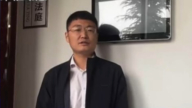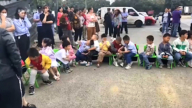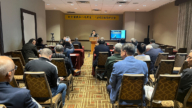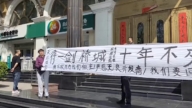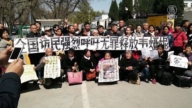【新唐人2012年3月29日讯】27号,联合国难民署对外公布的最新年度统计显示,世界上申请难民资格最多的是阿富汗人,紧跟在后的是中国人;另外,“胡润研究院”与“兴业银行”发布调查报告显示,中国亿万资产以上的人群数量约6.35万人,其中90%计划送孩子出国留学。分析指出,在中共专制体制下,人人自危,送子女到国外读书是每一个中国家庭的梦想,也是贪官污吏和富豪们转移国内财产的一个重要途径。
联合国难民署27号对外公布的最新年度统计显示,2011年在工业化国家递交难民庇护申请的人数猛增20%。阿富汗申请难民庇护人数占第一,多是在10年战争期间为逃离贫困和迫害的民众;而中国人位居第二,仅去年就有2万4千4百多人,其中五分之三是申请到美国政治避难,比前一年增长了13%。
北京宪政学者陈永苗指出,这说明中国的政治环境恶劣,看似平稳,其实是没有硝烟的战争。
陈永苗:“中国的一些难民最主要是政治压迫的一个产物,说明中国的政治环境比较恶劣吧,你可以看到其他的,阿富汗的它是战争形成出来的,在中国,它可能也是对中国政府统治下,对老百姓也存在着一个低劣的,潜在的战争。”
另外,“胡润”联合“兴业银行”27号也发布了《2012中国高净值人群消费需求白皮书》。这份白皮书是去年10月至今年1月间,面对面访问中国高净值人群而完成的一份报告。调查显示,中国大陆个人资产在600万元以上的270万人中,有85%计划送孩子出国留学;个人资产在亿万元以上的6万3千5百人中,90%计划送孩子出国留学,其中66%考虑在中学和小学阶段将孩子送出去。
大陆作家铁流:“只要有钱的人都会把子女送出去,因为中国教育教不出人才来,不是有句话嘛:‘北京大,北大结天下英才,毁之于天下英才’,所以中国的教育是很糟糕的,教不出人才,我也把我子女送到国外去啊,我也不算富豪,只要是有钱的人,中产阶级都愿意把子女送到国外读书。”
大陆律师李天天也表示,不只是富豪想把子女送到国外留学,这也是每个家庭的梦想,只是没条件。她说,就是这么一群没条件出国留学的人,在用自己的血汗支撑着中国GDP的增长,和供养着那些吃喝不作为的贪官污吏。
李天天:“中国这个环境,整个物理环境被污染,人文环境也污染的很厉害,如果有钱的话谁都愿意把孩子送到国外去,接受更人性化的教育,生活在更人性的物质和人文的环境当中,这是每个家庭的理想。包括那些贪官,‘装睡的人’,醒悟的人都是这样想的,所以中国共产党就是‘皇帝新装’里的那个皇帝,它们知道一切,但是就是装模作样,欺骗老百姓。”
陈永苗指出,这反映了在这个专制体制下,有钱人对中国未来的经济安全、金融安全、子女的出路都非常的失望。
陈永苗:“ 不单纯是一个教育问题的,不是说在海外读书是因为海外的教育好,不是的,不是的,他单是为了拿户卡,227-247觉得国内不安全,这是一个因素;第二个因素他可能算是移民也是他转移国内财产,非法财产的,不安全非法财产的一个途径。”
今年2月,中国银行和胡润联合发布的《2011年中国私人财富管理白皮书》中也显示,在中国高净值人群中,14%的人已经移民海外,另有46%的富人正在计划或者办理移民。也就是说,当后者也完成移民手续后,每5个有钱的中国人中,将有3个是外国籍。
采访编辑/李韵 后制/周平
China: No. 2 Refugee Applicant Country
On 27th March, the latest UN refugee statistics show that
Afghanistan is the top country for refugee applications.
In 2nd place is mainland China.
The joint report released by Hurun Research Institute and
Industrial Bank show that over 90% of billionaires plan to
send their children abroad.
Analysts say that for those living under the authoritarian
ruling of the Chinese Communist Party (CCP), every Chinese feel insecure.
Sending their child to study abroad now is a dream for
every Chinese family.
Meanwhile, it is an important way for those corrupt officials
and the rich to transfer their illegal domestic properties.
On 27th March, UN refugee agency’s latest annual statistics
show that the
number of refugees application filed in industrialized countries
surged by 20% in 2011. Afghanistan topped the ranking.
Most of the Afghan applicants were victims of the 10-year
civil war, who wanted to flee poverty and persecution.
China ranked 2nd on the list. In 2011 alone, the figure of
Chinese refugee applications exceeded 24,400.
Three-fifths of them were application for political asylum in the U.S.
The number increased by 13% over the previous years.
Beijing constitutional scholar Chen Yongmiao says
it indicates China’s political situation is harsh,
although it seems outwardly stable.
In fact, Chen calls it a war without gun smoke.
Chan Yongmiao: “Chinese refugees are mainly a product of
political oppression. This shows China’s political environment is rather poor.
It’s different from others, such as Afghan refugees, who
live in the aftermath of the war.
In China, political repression may be deemed as a potential
war waged on the people surviving under CCP rule."
On 27th March, the Chinese Luxury Consumer White Paper
2012 was released, jointly published by the Industrial Bank and Hurun Research Institute.
The paper was finished based on face-to-face visits that
were conducted from October 2011 until January 2012.
The survey shows that in mainland China, among
2.7million people with personal assets of over RMB 600 million,
85% have planned to send their children to study abroad;
among 63,500 people with personal assets above
RMB 100 million, 90% have the same ideas, and
66% of them considered sending their children abroad
at the stage of primary and secondary schools.
Tie Liu (Writer, China): “People are all willing to send their
children abroad as long as they can afford it.
Because China’s education system can’t foster talent.
There is a saying:
“Beijing is great, the most capable gather at Beijing University,
where also ruined their intelligence and capabilities.”
So China’s education is rather terrible.
I’ve also sent my children overseas, although I’m not rich.
The rich and the middle class are all willing to send their
children to study abroad."
China’s lawyer Li Tiantian has the same expression.
Sending children out to study abroad is also a dream for
every Chinese family, they just cannot afford it, says Li.
However these people, who cannot afford overseas
study for their children, support China’s GDP growth.
Their hard work and contribution raised those corrupt
officials with lavish spending but administrative inaction, according to Li.
Li Tiantian: “In China, the entire physical environment has
been polluted, it’s more terrible for the social surrounding.
If it’s affordable, everyone wants to send his child abroad.
Living there, their education and life will be more humane.
That is the dream for every family here in China, including
those corrupt officials.
All the people “pretending to be asleep"and
awake think so.
The CCP is just the emperor of the story
“The Emperor New Clothes".
They know everything about putting on airs and
fooling the public."
Chen Yongmiao says the fact reflects that under this
authoritarian system, the wealthy feel very disappointed with China’s future.
This includes security on China’s future economy,
finance and their children’s future, Chen analyzes.
Chen Yongmiao: “It’s not just a simple education issue.
Studying overseas is not due to good quality there. No, it isn’t.
Firstly, he wants gain permanent residency there,
for feeling insecure in China;
Secondly, as an immigrant, he can use this way
to transfer his domestic illegal property to overseas."
This February, Bank of China and Hurun Report jointly issued
“China Private Wealth Management White Paper 2011″.
The report showed that in the group of China’s luxury
consumers, 14% have emigrated overseas, another 46% are planning or in the process of emigrating.
That is, after these 46% have finished their emigration,
for every 3 out of 5 wealthy Chinese people, hold western countries passports or green cards.


